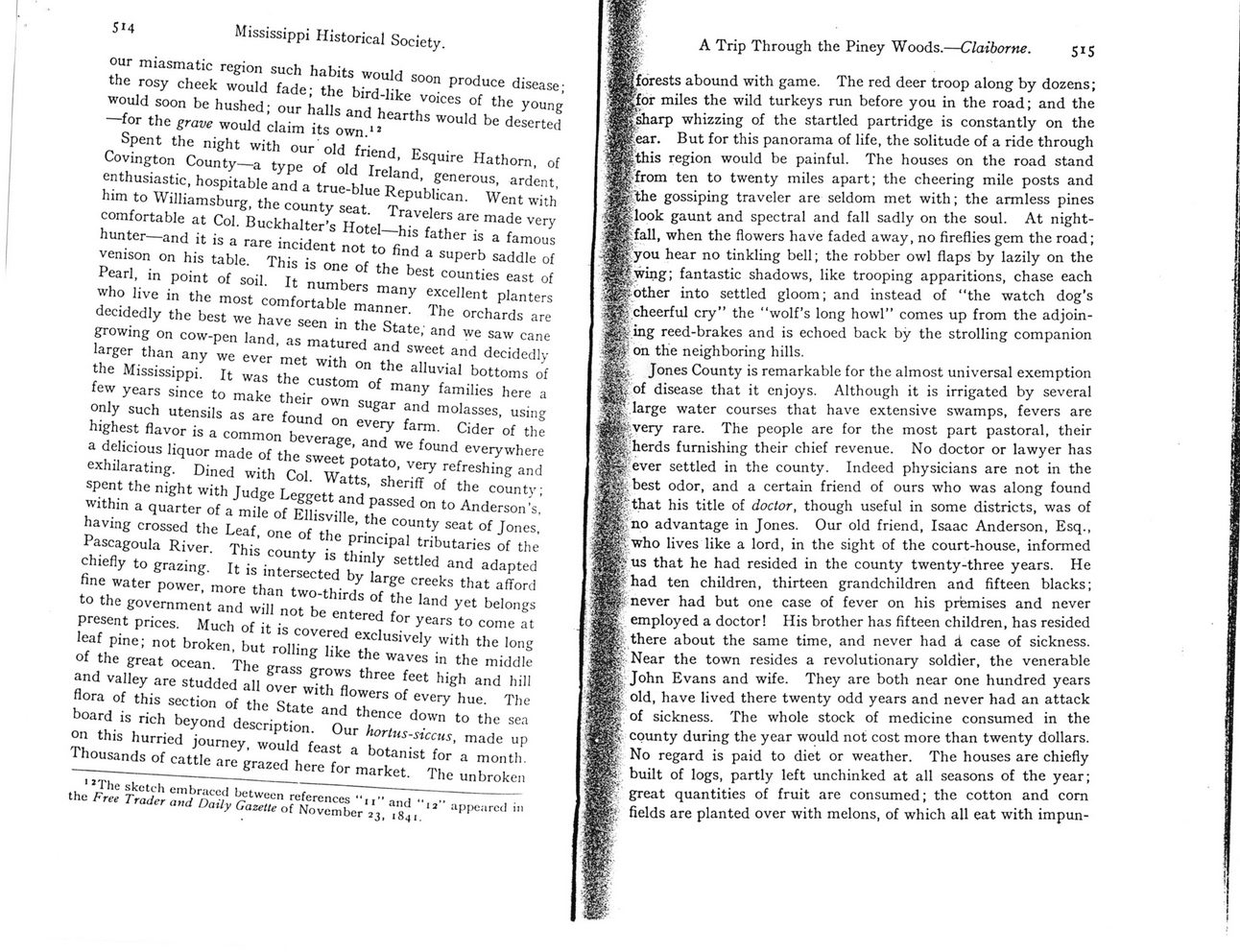This text was obtained via automated optical character recognition.
It has not been edited and may therefore contain several errors.
SM Mississippi Historical Society. our miasmatic region such habits would soon produce disease; the rosy cheek would fade; the bird-like voices of the young would soon be hushed; our halls and hearths would be deserted ?for the grave would claim its own.1J Spent the night with our old friend, Esquire Hathom, of Covington County?a type of old Ireland, generous, ardent, enthusiastic, hospitable and a true-blue Republican. Went with him to Williamsburg, the county seat. Travelers are made very comfortable at Col. Buckhalter?s Hotel?his father is a famous hunter?and it is a rare incident not to find a superb saddle of venison on his table. This is one of the best counties east of Pearl, in point of soil. It numbers many excellent planters who live in the most comfortable manner. The orchards are decidedly the best we have seen in the State; and we saw cane growing on cow-pen land, as matured and sweet and decidedly larger than any we ever met with on the alluvial bottoms of the Mississippi. It was the custom of many families here a few years since to make their own sugar and molasses, using only such utensils as are found on every farm. Cider of the highest flavor is a common beverage, and we found everywhere a delicious liquor made of the sweet potato, very refreshing and exhilarating. Dined with Col. Watts, sheriff of the county ; spent the night with Judge Leggett and passed on to Anderson?s, within a quarter of a mile of Ellisville, the county seat of Jones, having crossed the Leaf, one of the principal tributaries of the Pascagoula River. This county is thinly settled and adapted chiefly to grazing. It is intersected by large creeks that afford fine water power, more than two-thirds of the land yet belongs to the government and will not be entered for years to come at present prices. Much of it is covered exclusively with the long leaf pine; not broken, but rolling like the waves in the middle of the great ocean. The grass grows three feet high and hill and valley are studded all over with flowers of every hue. The flora of this section of the State and thence down to the sea board is rich beyond description. Our hortus-siccus, made up on this hurried journey, would feast a botanist for a month. Thousands of cattle are grazed here for market. The unbroken ' lThe sketch embraced between references "11? and ?12? ap(>carcd in the Free Trader and Daily Gazette of November 23, 1841. A Trip Through the Piney Woods.?Claiborne. 515 forests abound with game. The red deer troop along by dozens; for miles the wild turkeys run before you in the road; and the .sharp whizzing of the startled partridge is constantly on the ear. But for this panorama of life, the solitude of a ride through this region would be painful. The houses on the road stand ?from ten to twenty miles apart; the cheering mile posts and 'the gossiping traveler are seldom met with; the armless pines ;look gaunt and spectral and fall sadly on the soul. At nightfall, when the flowers have faded away, no fireflies gem the road; 'you hear no tinkling bell; the robber owl flaps by lazily on the rwing; fantastic shadows, like trooping apparitions, chase each ??other into settled gloom; and instead of ?the watch dog?s cheerful cry? the ?wolf?s long howl? comes up from the adjoining reed-brakes and is echoed back by the strolling companion : on the neighboring hills. c Jones County is remarkable for the almost universal exemption of disease that it enjoys. Although it is irrigated by several large water courses that have extensive swamps, fevers are very rare. The people are for the most part pastoral, their '!;herds furnishing their chief revenue. No doctor or lawyer has ?? ever settled in the county. Indeed physicians are not in the . best odor, and a certain friend of ours who was along found that his title of doctor, though useful in some districts, was of 'no advantage in Jones. Our old friend, Isaac Anderson, Esq., ?'who lives like a lord, in the sight of the court-house, informed t us that he had resided in the county twenty-three years. He f had ten children, thirteen grandchildren and fifteen blacks; ;; never had but one case of fever on his premises and never employed a doctor! His brother has fifteen children, has resided ;; there about the same time, and never had i case of sickness. vNear the town resides a revolutionary soldier, the venerable : John Evans and wife. They are both near one hundred years old, have lived there twenty odd years and never had an attack " of sickness. The whole stock of medicine consumed in the j;' county during the year would not cost more than twenty dollars. No regard is paid to diet or weather. The houses are chiefly built of logs, partly left unchinked at all seasons of the year; great quantities of fruit are consumed; the cotton and com ? fields are planted over with melons, of which all eat with impun-

Claiborne, J.F.H Claiborne-J.F.H-025